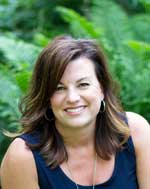Interview with Angela Avery – Licensed Professional Counselor and Board Certified Counselor

About Angela Avery, MA, LPC, NCC: Angela Avery, MA, LPC, NCC is a nationally certified counselor, who has written for GoodTherapy.org, Amazon.com and community blogs. She focuses on divorce, teen mental health, parenting issues, marriage and work/life balance. You can find her at The Counseling Studio.
[OnlineCounselingPrograms.com] During your education at Oakland University, you pursued a post-master’s specialization in child and adolescent therapy. What influenced you to want to work with this population?
[Angela Avery, MA, LPC, NCC] I knew before getting my Master’s Degree in Counseling that I would be working primarily with children and teenagers. Therefore, pursuing my post-master’s specialization was a natural fit and an investment in my career. I have always felt a calling to work with a younger population, and have made an effort to professionally and personally work with kids and teens. I am also a mother to two teenage daughters, who give me a great deal of inspiration.
[OnlineCounselingPrograms.com] For career changers, can you speak more on how you decided to pursue a career as a professional counselor after graduating with a Bachelors in Advertising?
[Angela Avery, MA, LPC, NCC] Well, my career path is quite squiggly, not a straight line. I have worked in advertising and real estate in my family’s commercial development company. My choice to switch gears started with a niggling feeling that I was in the wrong place; doing the wrong thing. Then the feeling became a voice, and the voice was very, very clear; “Do what you want for a change! Help others directly, you are a healer!” After that, I enrolled in school again (even though I was fearful) while working full-time and raising two children. While it was difficult to manage my time, I think my kids are very proud of me and have learned from me that it’s never too late to pursue your calling.
[OnlineCounselingPrograms.com] How do you best decide which therapeutic approach is best for your individual clients?
[Angela Avery, MA, LPC, NCC] I decide what approach works by starting small with simple unconditional positive regard. Then I add in evidenced based practices like cognitive behavioral therapy (CBT) or dialectical behavior therapy (DBT) depending on what’s being presented. I always practice eclectic therapy because I have found that one theory and approach rarely works for my clients, who come to me looking for a mix of strength and encouragement and challenge and truth. Most appreciate my directness and willingness to try new approaches.
[OnlineCounselingPrograms.com] In what ways, outside of your practice, do you advocate for your clients? Do you think that advocacy for clients out of the office is a necessity for counselors or a professional development opportunity to expand their understanding?
[Angela Avery, MA, LPC, NCC] I advocate in my community by being a leading part of a wellness campaign designed to promote positive mental health in my community’s schools. I feel strongly that kids today have too much pressure; academically, socially and emotionally. Since we can’t change society and academics, we must teach our children tools and skills to handle this kind of pressure. I am honored to work with administrators, teachers and students to grow mentally healthy kids. I think advocacy is important for both clients and counselors – no one should remain stagnant and passive!
[OnlineCounselingPrograms.com] Apart from your specialization in child and adolescent therapy, you also focus on marriage and divorce. What supports your statement that you “understand divorce better than most”?
[Angela Avery, MA, LPC, NCC] One of the main reasons for becoming a counselor was my tumultuous divorce from my children’s father. I wanted to support women and children through the process using my clinical knowledge and personal experience. Having had a challenging divorce and rocky co-parenting journey, I am better able to relate to people who are discussing court issues, feelings of failure, and financial stress than counselors who have not experienced divorce personally. In addition, I am a statistic myself, having divorced parents, which makes understanding the position of the child helpful.
[OnlineCounselingPrograms.com] You have mentioned that you believe “counseling is for the courageous”. Can you tell us more about the value of empowering clients to take steps towards positive change?
[Angela Avery, MA, LPC, NCC] I believe that empowered counselors empower clients. Counseling is a courageous act in itself – talking to a stranger about your problems, hearing commentary on your problems, responding to questions and answers – that’s brave. I try very hard to show my clients by my words and actions that they have strengths to rely on, resources to use and options to assess. Empowering clients to SEE their reality is the goal, and in turn, they usually make positive life changes.
Thank you for your time and insight into counseling, Angela!
Discover more on how to become a licensed professional counselor with our Counseling Career Guides!
Last updated: April 2020

